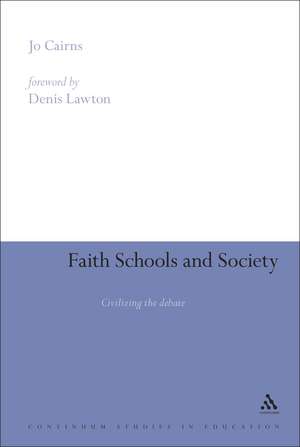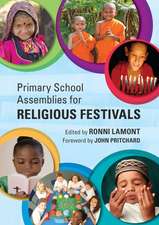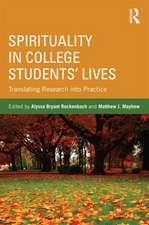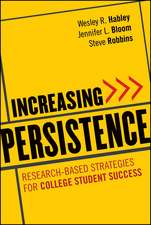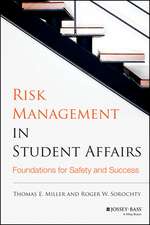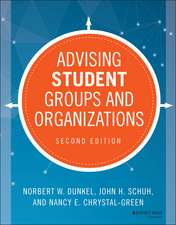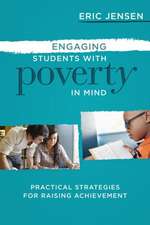Faith Schools and Society: Civilizing the Debate
Autor Dr Jo Cairnsen Limba Engleză Paperback – 19 oct 2011
- Do faith schools have a place in a plural society?
- Which types of school contribute most effectively to a plural society?
This fascinating monograph seeks to answer these questions and more by exploring the fit between personal, spiritual and academic goals in contemporary educational experience and individual school cultures.
Jo Cairns, a well-respected authority on faith schools, argues that educational ideology in plural societies has to find a way of recognizing and responding to the 'predicament' of pluralism as it is experienced by individuals and communities.
This provocative and challenging book will undoubtedly stimulate debate among educationists across the world.
- Which types of school contribute most effectively to a plural society?
This fascinating monograph seeks to answer these questions and more by exploring the fit between personal, spiritual and academic goals in contemporary educational experience and individual school cultures.
Jo Cairns, a well-respected authority on faith schools, argues that educational ideology in plural societies has to find a way of recognizing and responding to the 'predicament' of pluralism as it is experienced by individuals and communities.
This provocative and challenging book will undoubtedly stimulate debate among educationists across the world.
| Toate formatele și edițiile | Preț | Express |
|---|---|---|
| Paperback (1) | 258.24 lei 6-8 săpt. | |
| Bloomsbury Publishing – 19 oct 2011 | 258.24 lei 6-8 săpt. | |
| Hardback (1) | 891.51 lei 6-8 săpt. | |
| Bloomsbury Publishing – 25 apr 2009 | 891.51 lei 6-8 săpt. |
Preț: 258.24 lei
Nou
Puncte Express: 387
Preț estimativ în valută:
49.42€ • 51.28$ • 41.31£
49.42€ • 51.28$ • 41.31£
Carte tipărită la comandă
Livrare economică 17-31 martie
Preluare comenzi: 021 569.72.76
Specificații
ISBN-13: 9781441197900
ISBN-10: 1441197907
Pagini: 284
Dimensiuni: 156 x 234 x 15 mm
Greutate: 0.4 kg
Editura: Bloomsbury Publishing
Colecția Continuum
Locul publicării:London, United Kingdom
ISBN-10: 1441197907
Pagini: 284
Dimensiuni: 156 x 234 x 15 mm
Greutate: 0.4 kg
Editura: Bloomsbury Publishing
Colecția Continuum
Locul publicării:London, United Kingdom
Caracteristici
A fully international monograph, including case studies based in the US, Indonesia, Grenada and Botswana.
Notă biografică
Jo Cairns was formerly Head of Religious Education at IOE, UCL's Faculty of Education and Society, University College London, UK, Head of Continuing Personal and Professional Development and Lifelong Learning, Westminster College, Oxford, UK, and Assistant Director at the Quality Assurance Agency for Higher Education, UK.
Cuprins
List of Tables and Figures \ Foreword by Denis Lawton \ Preface \ Introduction \ Part I: An Intellectual Framework to Support a Civic Conversation about Faith Schools in Plural Societies \1. The Urgent Need for a Civilized Conversation about Faith Schools and Society \ 2. A Reassessment of the Place of Faith Schools in State Supported Education in Plural Democratic Societies \ 3. To What Extent Can Plural Societies Which Encompass a Spectrum of World Views and Cultural Perspectives Sustain a Common Schooling For All? \ 4. The Role of Faith in the Schools of Civic Societies \ Part II: Developing a Process for the Study of Faith-based Schools and their Cultures within Plural Societies \ 5. Towards the Establishment of an Evidence Base for Use in a Civic Conversation about Faith Schools in a Plural Society \ 6. Faith School Profiles \ Part III: Profiling Faith School Cultures \ 7. Four Catholic Schools and their Cultures \ 8. The Student Voice and Its Significance in the Study of School Cultures \ 9. Building a Meta-narrative of School Cultures from a Composite Profile of Four Faith Schools \ 10. Practice Informing Policy: The Case for Evidence-based Policy Concerning Faith-based Schools \ Bibliography \ The Student Questionnaire \ Index
Recenzii
'Should plural societies operate pluralistic schools in which no one ideology prevails - other, of course, than the hidden ideology of assumed neutrality - or should they do justice to the idea of a plural society by allowing a range of faith schools to operate side by side? This is fast becoming a pressing but disputed question in many countries. To produce this book Jo Cairns has toured some unexpected parts of the world in search of answers.' Jack Priestley, Research Fellow, School of Education and Lifelong Learning, University of Exeter, UK
'It is rare to find a work which skillfully combines rigorous empirical research and fluid, rich prose. In this work, Dr. Cairns accomplishes this feat around a much widely discussed and frequently emotionally charged topic, namely faith based schools. Her rich and extensive experience in researching various facets of schooling serve her well as she presents her findings. Especially welcome, and quite remarkable in my opinion, is the inclusion of the student voice. As Dr. Cairns indicates in her Introduction, she has "attempted to put individual school cultures and their student voices at the heart of the debate about faith schools." Her rigorous adherence to principles of empirical research, and her carefully nuanced interpretation of the findings are presented to advance conversations about education for and in pluralism. This makes for a most engaging, informative, and lively read. All who are concerned with education for and in a pluralist environment will benefit from this scholarly work.' Gloria Durka, Graduate School of Religion and Religious Education, Fordham University, USA
'It is rare to find a work which skillfully combines rigorous empirical research and fluid, rich prose. In this work, Dr. Cairns accomplishes this feat around a much widely discussed and frequently emotionally charged topic, namely faith based schools. Her rich and extensive experience in researching various facets of schooling serve her well as she presents her findings. Especially welcome, and quite remarkable in my opinion, is the inclusion of the student voice. As Dr. Cairns indicates in her Introduction, she has "attempted to put individual school cultures and their student voices at the heart of the debate about faith schools." Her rigorous adherence to principles of empirical research, and her carefully nuanced interpretation of the findings are presented to advance conversations about education for and in pluralism. This makes for a most engaging, informative, and lively read. All who are concerned with education for and in a pluralist environment will benefit from this scholarly work.' Gloria Durka, Graduate School of Religion and Religious Education, Fordham University, USA
